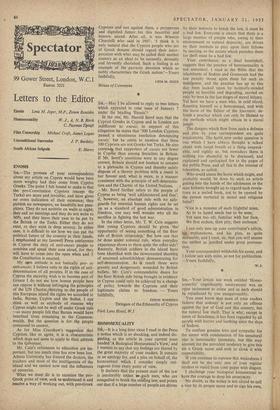Letters to the Editor Enosis Lena M. Jeger, M.P., Zenon
Rossides Homosexuality W. J., A. N. B. Birch C. Paxman Tiptaft Film Censorship Michael Croft, James Logan Unconditional Surrender J. P. Bardsley South African Schpols E. Harris
ENOSIS
SIR,—The protests of your correspondents about my article on Cyprus would have been more weighty had they come from Cypriot Greeks. The point I felt bound to make is that the pro-Constitution Cypriots (except the Turks) are mute and invisible, and have given no overt indication of their existence; they publish no newspapers, no handbills nor pam- phlets. They do not scribble on walls at night; they call no meetings and they do not write to MPs, and they leave their case to be put by the British or the Turks. Either they do not exist, or they exist in deep secrecy. In either case, it is difficult to see how we can put the political future of the country in their hands. I emphasised at my farewell Press conference in Cyprus the duty of anti-enosis people to combine and speak their case aloud, for they will have to come into the open when and if the Constitution is enacted.
My awn attitude is not basically pro- or anti-enosis. I believe only in the rights of self- determination of all peoples. If in the case of Cyprus the majority wish is to become part of Greece I do not see how honest people here can oppose it without infringing the principles of the UN Charter,/denying to .the people of this European island the rights we accorded to India, Burma, Ceylon and the Sudan. I can think as well as anybody of reasons why Cyprus might not be well off under Greek rule —as many people felt that Burma would have benefited from remaining in the Common- wealth. But the question is for the people concerned to answer.
As for Miss Crayshaw's suggestion that Cypriots like to agree, it is a characteristic which does not seem to apply to their attitude to the G6vernor.
Mr. Cain's references to education are im- portant, but too much time has now been lost. Athens University has trained the doctors, the teachers and most of the intelligentsia of the island and we cannot now end the influences of centuries.
What we must do is to examine the pro- Greek point of view, seek to understand it and resolve a Way of working out, with pro-Greek
Cypriots and not against them, a prosperous and dignified future for this beautiful and historic island. After all, it was Winston Churchill who said in 1907: '1 think it is only natural that the Cypriot people who arc of Greek descent should regard their incor- poration with what may be called their mother country as an ideal to be earnestly, devoutly and fervently cherished. Such a feeling is an example of the patriotic devotion which so nobly characterises the Greek nation."—Yours faithfully, House of Commons
LENA M. JEGER


































 Previous page
Previous page